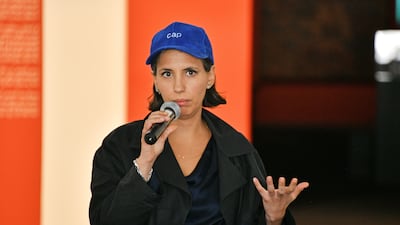In 2009, at the age of 26, Qatari-American artist, writer and director Sophia Al-Maria took the stage at the Doha Tribeca Film Festival to accept the award for Most Promising Filmmaker, handed to her by none other than Robert De Niro.
Now, about 15 years later, her most ambitious work is finally set to be realised, one she never thought would see the light of day due to the legal concerns raised in 2014 about similarities to another film.
Producer Uri Singer (Netflix’s White Noise) and Aimee Peyronnet have, however, acquired the rights to Al-Maria’s script Beretta, described as a female-focused take on Martin Scorsese’s classic Taxi Driver, but set in Cairo. A global theatrical release is expected, but the details remain under wraps for now.
“Al-Maria’s approach to storytelling is particularly noteworthy,” Singer tells The National in an exclusive interview.
“The Beretta script is a fearless exploration that is universally resonant, as it integrates personal narratives with broader socio-political themes. The script is so good and unique that anyone who reads it appreciates the writer, and it makes me happy to make this film come to life,” he continues.
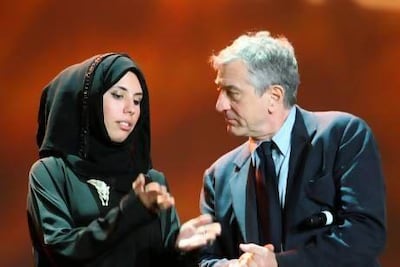
In 2014, Al-Maria spoke extensively to The National about the then-cancelled project, which the multi-hypenate turned into an art installation in the UK that year.
"As with any feature film production, it became a bit of a saga," Al-Maria said at the time. "We'd got to the very last hurdle before production, but then hit a snag because someone had called Beretta 'the Egyptian Ms 45'."
Ms. 45 is Abel Ferrara's cult exploitation film from 1981, exploring the various revenges of a mute woman who is assaulted twice in one day on her way home from work.
"Lawyers got involved," Al-Maria said. "To cut a very boring story short, the financiers didn't like the possibility that somewhere along the line, someone might say that Beretta was too similar and want compensation."
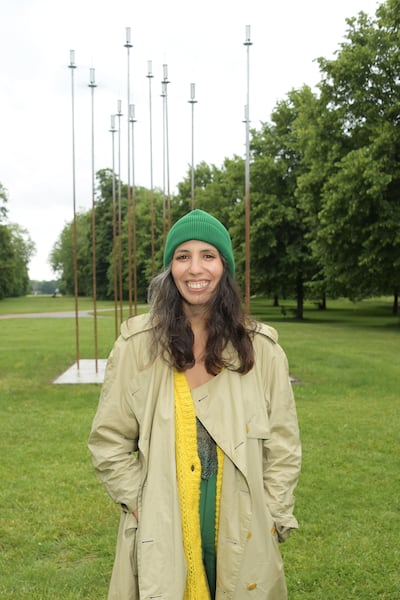
Al-Maria called the experience, which stopped the film from moving forward at the time, “soul-crushing”.
“At least this exhibition is the consolation prize,” she continued back then. “I hope it lifts the lid on how hard it is to do even a low-budget film – and how, when contracts and lawyers are involved, the idea shifts so much from its original starting point that you end up in danger of making something completely different.”
In the years since, Al-Maria’s stature in the art world, not to mention the worlds of film and television, have only grown. Credited with coining the term “Gulf futurism”, the artist published her memoir, The Girl Who Fell To Earth in 2012, translated to Arabic in 2015, and has exhibited work at Gwangju Biennale, The Tate Modern, and The Architectural Association School of Architecture in London.
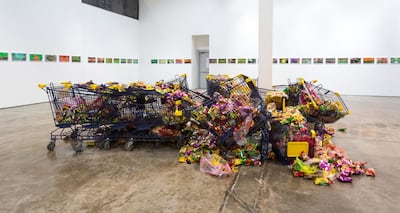
Her British television series Little Birds, which she created and co-wrote, was released on Sky Atlantic in 2020, and has since been distributed across the world. The positively-reviewed miniseries was based on the work of Anais Nin, and starred Fargo and Ted Lasso star Juno Temple.
For Singer, part of the draw to working with Al-Maria was her success across several fields.
“I try to combine art and film. Sophia Al-Maria has distinguished herself as a significant contemporary artist with her unique perspective and innovative approach to storytelling,” he says.
“Her work stands out and blends elements of Islamic tradition with a futuristic ethos, offering a nuanced critique of consumerism, environmental destruction, and the cultural impact of rapid technological advancement.
“As a creative, Sophia Al-Maria’s multifaceted career as an artist makes her a creative force in the art world, and her talent as a writer is awe-inspiring. When I was introduced to her work, I was compelled to find a way to collaborate with her,” he adds.
Singer describes the project as an intense character study full of dynamic storytelling reminiscent of a Tarantino film. The producer, whose film White Noise was directed by Academy Award nominee and Barbie co-scribe Noah Baumbach, is himself making a particular investment in the Middle East region, especially in the Gulf.
His company Passage Pictures also recently announced the film Sands of Fortune, which recounts the discovery of oil in Saudi Arabia and the early days of Aramco, according to Deadline.
“The story of Aramco is a testament to human ingenuity and the incredible impact that a single discovery can have on the world. This is a story that all Saudis know, but I believe the whole world will soon be as intrigued as I was when I first heard about this,” Singer told Deadline.
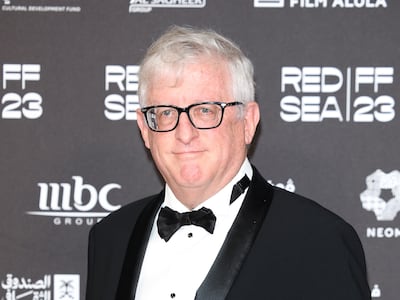
In Beretta’s case, the draw was in making a cross-cultural project, collaborating with an American filmmaker with roots in the Gulf to tell a story set in Egypt, particularly from a woman’s perspective.
"Bringing Beretta to life is more than just making a film; it's about weaving a narrative that resonates with the diversity and complexity of human experiences,” he says, adding that it is a testament to the power of collaboration and the universal language of art.
